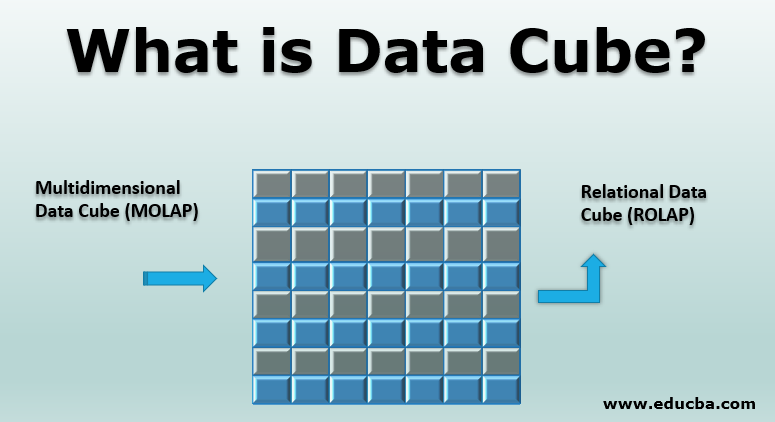Updated March 21, 2023

Introduction to Data Cube
A Data cube as its name suggests is an extension of 2-Dimensional data cube or 2-dimensional matrix (column and rows) Whenever there are lots of complex data to be aggregated and there is a need to abstract the relevant or important data. There comes into picture the need for the data cube.
A Data cube is basically used to represent the specific information to be retrieved from a huge set of complex data. For example, You went to a shopping mall which has lots of items placed in different corners of the shopping mall and It is very difficult to find the item of need at the hour of need. Now if you are acknowledged about the order of the items placed in a shopping mall, buying of that item will become easy and hassle-free. This represents that a data cube with perfect dimensions and higher value ranges or we can say a reference to three-dimensional data as well.
What is Data Cube?
It has many characteristics are as follows:
- It can go very far beyond to include many more dimensions.
- Improvises business strategies by analysis of all the data.
- It helps to get the latest market scenario by establishing trends and performance analysis.
- It plays a very pivotal role by creating intermediate data cubes to serve the requirements and to bridge the gap between the data warehouse and all the reporting tool, particularly in a data warehouse reporting tool.
- In other phases there will be source input which is simultaneously monitored and administered, the goal is to create a connection and end to end flow between source to destination with intermediate data cubes interacting with servers.
Types of Data Cube
There are two types of Data cubes which are used mostly in business or enterprises:
1. Multidimensional Data Cube (MOLAP)
As its name suggests Multidimensional Data cube is used mostly in the business requirement where there are huge sets of data. Products developed and follow involves the structure of MOLAP which has a multidimensional array format. This structure helps in improving the huge data set with a sparser and an increased level of MOLAP. From this, we can come into a fact that this will not represent any specific data or clustered data value from a data set.
This will ultimately increase the space or storage requirements which are sometimes not the need of the hour. Thus, making the structure undesirable hampering the data values and sets of dimensions representing the data.
One of the interesting goals of this MOLAP is that it has an indexing format for representing each dimension of a data cube which improves the overall development and structure to gather more relevant information.
But as everything has an advantage also has a disadvantage which in this case is discussed for huge data sets and sparser matrix which is sometimes undesirable. So, to avoid and to make the structure desirable we will make use of compression techniques which will reduce the hampering of indexing property of the so very needed business model of MOLAP.
2. Relational Data Cube (ROLAP)
It is also another category of data analysis data cube which religiously follows the relational database model. If we compared to the Multi-dimensional data cube, then it possesses double the number of relational tables to specify the dimensions with data sets and requirements. Each of these tables contains a specific view which is called as a cuboid.
There are many more categories being researched and kept an eye on as they are very booming like SOLAP, DOLAP, WOLAP, etc.
Hybrid OLAP also exists which is nothing but the combination of both ROLAP and MOLAP. It is also used very significantly but then again depends on business requirements. Hybrid OLAP is not the most often used data cube but then many organizations prefer because of its superior and data processing capability. Another very nice quality is that it contains a check on both the Multi-dimensional and relational database which helps in managing the data and data inside databases very efficiently. This helps in optimized consumption of time by optimizing and managing the cells. To strike the difference and get in comparison with both HOLAP can be preferential because of its managing abilities.
In terms of Data mining concepts of data analysis data, cube plays a very pivotal role for both categories of MOLAP and ROLAP.
Benefits
- Increases the productivity of an enterprise.
- Improves the overall performance and efficiency.
- Representation of huge and complex data sets get simplified and streamlined.
- Huge database and complex SQL queries are also manageable.
- Indexing and ordering provides the best set of data for analysis and data mining techniques.
- Faster and easily accessible as It will posses pre-defined and pre-calculated data sets or data cubes.
- Aggregation of data makes access to all data very fast at each micro-level which ultimately leads to easy and efficient maintenance and reduced development time.
- OLAP will help in getting Fast Response time, Fast curve of Learning, versatile environment, reach to a wide range of reach to all applications, need of resources for deployment and less wait time with a quality result.
Conclusion
In today’s scenario, all big business giants are trying their level best to strategize and get the business streamlined with certain data models and data cubes. Researchers are also trying to come up with more diversified and enhanced business models to make the entire production and development of business organizations.
Recommended Articles
This is a guide to What is Data Cube? Here we discuss what is data cube and types of data cubes along with benefits. You may also look at the following articles to learn more –

